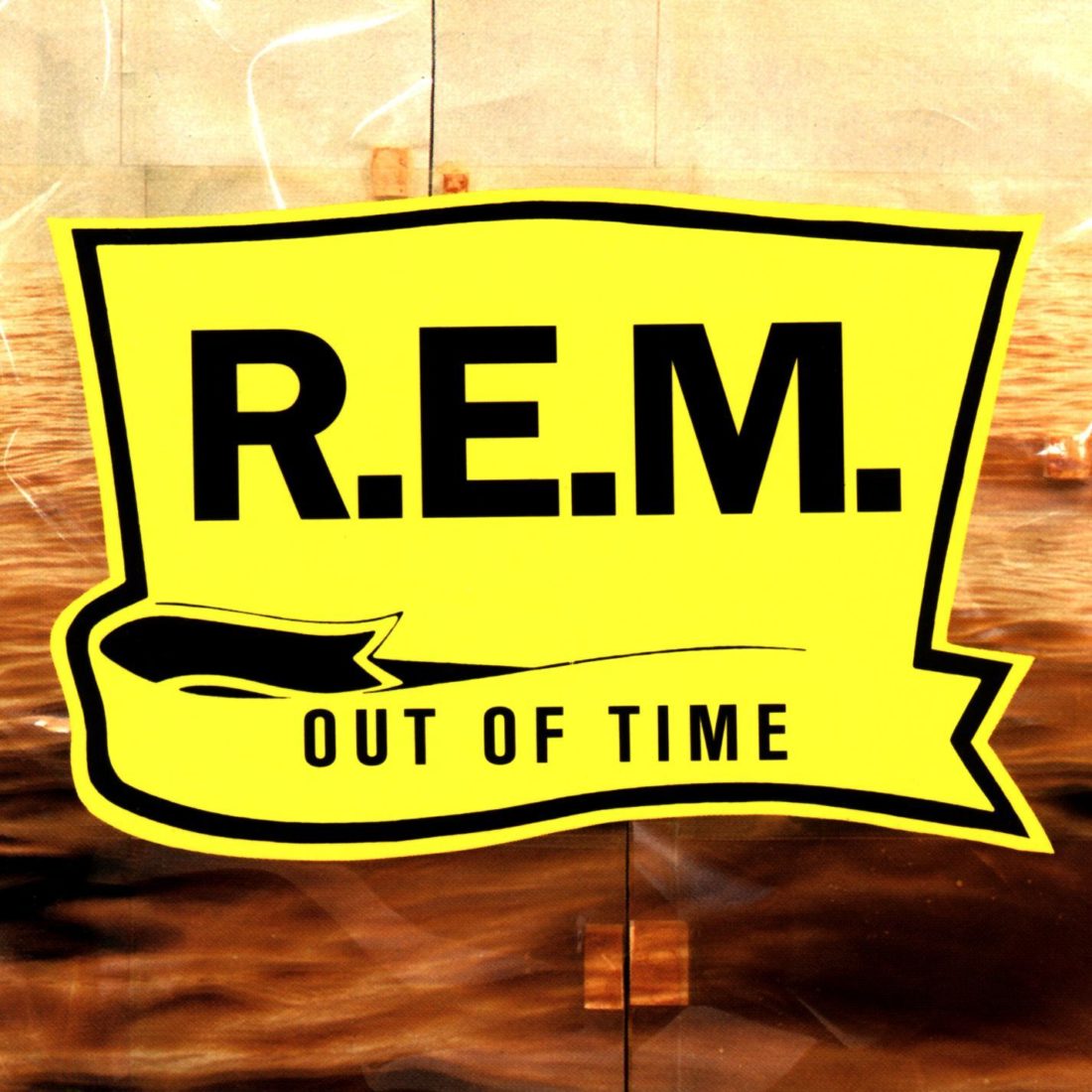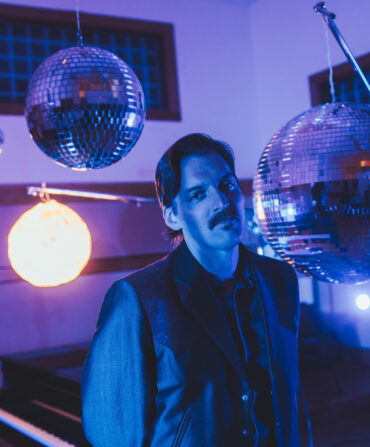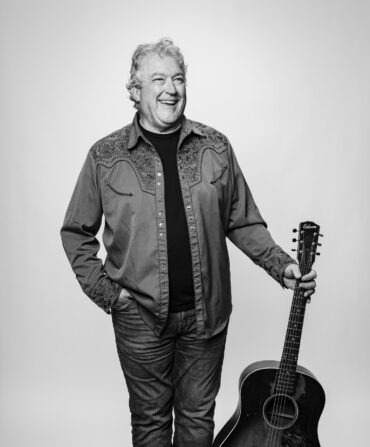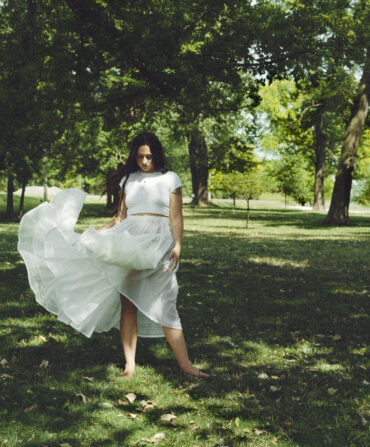At the end of 1989, the members of R.E.M. were exhausted. Six studio albums and endless tours saw them graduating from playing Athens, Georgia, house parties to headlining more than 130 arenas and theaters during the massive tour supporting their 1988 album Green. But after a six month break, the band were back at it, recording songs that would make up Out Of Time, an album that transformed America’s favorite cult outfit into one of the world’s biggest bands.

Photo: Frank Okenfells III
From left: Bandmates Mike Mills, Michael Stipe, Peter Buck, and Bill Berry.
Released in 1991, Out of Time may not be R.E.M.’s best album, but its importance cannot be overstated. The band—lead singer Michael Stipe, guitarist Peter Buck, bassist Mike Mills, and drummer Bill Berry—felt a sense of freedom in the studio, daring themselves to explore different musical avenues. Out of Time is quirky: An influx of country and roots music seeps into several songs, haunting numbers such as “Low” and “Belong,” where Stipe speaks more than he sings. And for the first time, the band brought in guest vocalists, including rapper KRS-One on the oddball opener “Radio Song” and the B-52’s Kate Pierson, who duets on the corny “Shiny Happy People” as well as the transcendent “Me In Honey,” one of the lesser known jewels in the R.E.M. canon.
But the signature track on Out of Time was the mandolin-driven “Losing My Religion,” which gave the band their biggest hit to date and with its transfixing video—which went on to win Video of the Year from MTV—helped shove them into the mainstream. It has absolutely none of the conditions for a hit single, says bassist Mike Mills. “It’s five minutes long, it doesn’t really have a chorus, and the lead instrument is a mandolin,” he says. “That is not a recipe for a hit.”
On Nov. 18, to celebrate the twenty-fifth anniversary of Out of Time, the band will release a special package with a newly remastered version of the album, a collection of demos that pulls back the curtain on the band’s creative process, plus audio from a gig at Mountain Stage in Charleston, West Virginia—one of the only live shows the band played in support of the album. Calling from Amsterdam, where he’s doing interviews for Out of Time, Mills gives Garden & Gun a behind-the-scenes look at Out of Time as well as insight into his recent foray into classical music and, perhaps most importantly, an update on his golf game.
Was there a conscious decision before the recording of Out of Time that you weren’t going to tour?
Oh yeah. We all knew that trying to get back on that train would have been bad for our personal health as well as the health of the band. We toured every year throughout the ‘80s, and after the Green tour, which was such a beast, we had to take a break. That gave us a certain amount of freedom. With most R.E.M. songs, you can still break them down to one guitar and play them in that way, or one keyboard. That still holds true for these songs. At the same time, we didn’t need to worry about reproducing them live, so there was that sort of freedom, too.
It did seem like you guys could really do no wrong at that point, and the possibilities were endless.
We felt that we were writing really good songs and that whatever we did was going to be cool. One thing we did do at that point was make a conscious decision not to write any more R.E.M. songs. By that, we meant we would come up with something and we’d play it in the studio, and we’d just go, “Nope, that sounds too much like an R.E.M. song, so let’s get rid of it.”
Really?
Yeah. Peter was definitely moving away from the electric guitar. He wanted to play a lot of different instruments. We recorded a lot with me on keyboards instead of on bass, and Bill played bass on some stuff, and Peter did as well. Bill played the congas on “Low.” We were just trying to shake things up. The record holds together, but the songs are really very different. I think they’re very distinct from the last couple of records we had done before.
So Out of Time comes out and it’s huge. Did you have any inkling?
No, every record we had made sold more than the one before it, up to that point, but this one became exponential. There’s just something about “Losing My Religion.” It was the right song at the right time by the right band, and it exploded, and it went literally worldwide.
“Losing My Religion” is actually a phrase that comes from the South.
Yeah, something happens and it freaks you out to the point where you would say, “I almost lost my religion.” The funny thing was that was supposed to be the set-up single. Our record company wanted to push “Shiny Happy People.”
You have lead vocals on “Near Wild Heaven” and “Texarkana,” a first for you on R.E.M. originals. Were you nervous?
Not really. My feeling was, if it wasn’t very good, the guys would tell me. I wasn’t too worried about it. We started doing “Texarkana,” and you can tell from the demo that Michael had started something, but then just kind of hit a wall and couldn’t finish it. I had some ideas, so I jumped in, and even though my ideas had nothing to do with the town of Texarkana, we just liked the title, so we kept it.
One of my favorites is “Belong,” which is really unique given that Michael speaks the lyrics while there’s a gorgeous chorus in the background.
It’s weird. To me, it sounds like Michael’s reading a newspaper. The funny thing is, it’s not him reading the newspaper out loud, it’s more like what you think in your head when you read a newspaper. Then the chorus is just all about the joy of singing. The chorus is just myself, Bill, and Michael having a really fun time creating melodies, and the beautiful passing chords that are created when those melodies intersect.
It’s just phenomenal. I find myself singing it, when I’m like, cleaning the bathroom or something.
Right? There’s one point in that song where it creates a beautiful three-part harmony, but it doesn’t happen throughout the song. It’s only one moment. When you’re making a record, it’s all about creating those certain magical moments that happen in the song.
Do you have a favorite song on the record? How do you feel about it when you listen back to it?
My trouble is it’s hard for me to just listen to R.E.M. for enjoyment, because I’m constantly analyzing and dissecting and thinking of what I would have done differently or done better. It’s not really necessarily a pleasurable thing for me in that sense. I enjoy “Half A World Away” because it’s just such a strange song. It’s got a harpsichord on it. It’s one of the weirder songs on the record, but I really like that one.
The live show included in this reissue is from Mountain Stage. Any recollections of the gig?
I remember it being pretty loose because we got to load up the show with our friends. We had Robyn Hitchcock and Billy Bragg opening. We felt really good about doing it because we were only doing a few promo shows and Mountain Stage was not in New York or L.A. or somewhere like that, but rather in West Virginia. It felt like the right thing to take it to somewhere like that, a place that didn’t always get the proper attention it deserved.
Since the band called it quits in 2011, you’ve still been active musically, including writing Concerto for Violin, Rock Band and String Orchestra with your childhood friend, Robert McDuffie, who is a world-renowned violinist. He pushed you to write it, how daunting was that?
It was extremely daunting, but what I’ve discovered in looking back at it now is that it’s not really a classical piece. It’s sort of a song suite that features Bobby’s virtuosity on the violin, which is one of the elements of a concerto. If I’d known to think of it in those terms, I probably would have called it a song suite instead of a concerto. It does have plenty of classical elements. It has the string orchestra with some beautiful classical arrangements on it, and it’s really fun to do. People didn’t really know how to market it or what to call it, but everybody that comes to the show loves it.
It feels like a rock show, it’s much more interactive than a traditional symphony.
I make an announcement before each show where I say, “This is not really a classical piece, and as such, we don’t want you to behave like you’re at a classical piece. Feel free to applaud at any time. If Bobby plays something on the violin you like, you can applaud that in the middle of the piece.” We’re trying to bring elements of classical and rock together, because classical, while it’s a wonderful art form, is not doing all that well in terms of popularity. We’re just hoping to get people to think about it a little differently, and maybe get some classical people to enjoy the rock elements of it, and then have the rock people enjoy the classical elements of it and see if we can’t just call it music.
How much of classical music was part of your musical education?
My father was a dramatic tenor, so he loved classical music and so did my mother. There was a lot of it being played in the house. We went to a lot of classical concerts. My dad, in particular, loved opera. We went to a lot of symphonies.
How’s your golf game?
Not good, but I’m about to take some time and try to whip it into shape. I’m playing some stuff in January that I need to be ready for. I’ll be playing in front of a lot of people.
What causes you more nerves—playing stadiums with R.E.M., putting on a classical concert, or going off the first tee in front of thousands?
Going off the first tee because I know how to play the bass. I feel pretty good about my musical competency. That’s not necessarily the case on the golf course.








